Mastering Parrot Care: A Detailed Guide for Owners
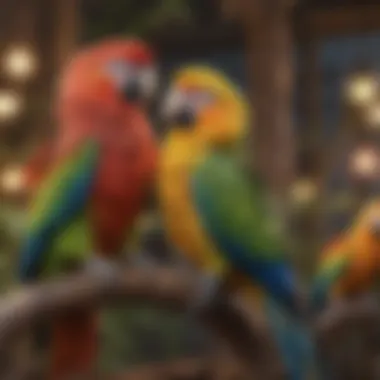
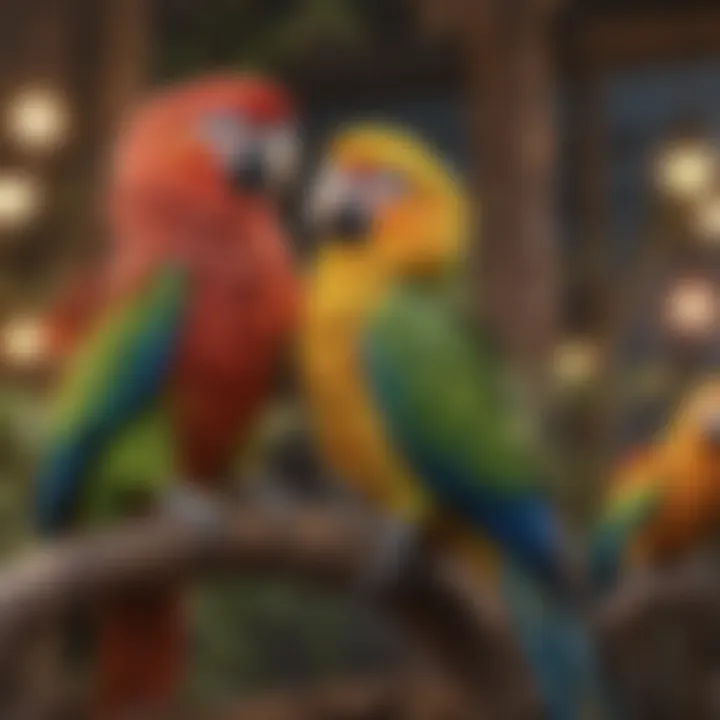
Intro
Living with a parrot can be both a rewarding and challenging experience. These vibrant creatures possess a wide range of needs and behaviors that differ significantly from traditional pets, like cats or dogs. By understanding the complexities of parrot living, owners can create an environment where their feathered friends can thrive and flourish.
The beauty of parrots lies in their playful nature, intelligence, and social inclination. However, with their unique social, environmental, and dietary requirements, meeting these needs is not always a walk in the park. This guide will delve deeply into various aspects of parrot care, behavioral understanding, nutrition, wellness, and enriching activities.
Whether you are a seasoned bird enthusiast or a first-time pet owner, you will discover practical insights that can help you foster a supportive atmosphere. Through this comprehensive examination, you can ensure not only the well-being of your parrot but also a harmonious coexistence.
Care Tips
Caring for a parrot involves several daily habits and long-term commitments that cater to their holistic needs. Here’s how you can set the stage for your avian companion’s happy life.
Daily Care Routines
Maintaining a consistent daily routine is essential for parrots. Regular feeding, social interaction, and playtime can help establish trust and stability. A simple daily checklist can include:
- Fresh water and food
- Daily cleaning of the cage
- A set time for handling and socializing
- Rotation of toys to avoid boredom
Cage Setup and Maintenance
Creating a spacious and safe habitat is vital. Parrots need room to stretch their wings and explore. When setting up their cage, consider the following:
- Use non-toxic materials for the cage and accessories.
- Provide multiple perches of different diameters to promote foot health.
- Include toys that encourage problem-solving and play.
- Ensure proper ventilation and sunlight exposure.
Regular maintenance is crucial. Clean the cage weekly and replace soiled bedding to ensure a healthy living environment.
Hygiene and Cleaning Practices
Birds are naturally inclined to mess, making hygiene a top priority. Daily cleaning of food and water dishes should not be overlooked. Monthly deep-cleaning sessions can include:
- Scrubbing perches and accessories with bird-safe cleaner.
- Checking for any signs of mold or pests.
- Re-evaluating placement of items in the cage to enhance enrichment.
Seasonal Care Adjustments
Parrots can be sensitive to changing weather conditions. In summer, ensure they have access to shade and fresh air, but be cautious of direct sun exposure. In winter, maintain a warm environment, avoiding drafts. Monitor humidity levels, as they can affect your parrot’s health and comfort.
"An ounce of prevention is worth a pound of cure."
The better prepared you are, the smoother your parrot's journey with you will be.
Behavioral Insights
Understanding parrot behavior can be a fascinating journey. Their body language communicates their feelings and needs effectively.
Understanding Bird Body Language
Parrots express themselves in various ways, from feather positioning to vocalization. Some key signals include:
- Fluffed feathers: Indicates comfort or contentment.
- Bobbed head: Shows interest.
- Biting or nipping: Can signify overstimulation or distress.
Common Behavioral Issues and Solutions
Some parrots may develop behavioral quirks. Identifying the root cause is essential for resolution. Common issues include:
- Screaming: Often a call for attention or boredom. Address this by spending more time interacting.
- Feather picking: Could indicate stress or an underlying health issue. A vet visit may be necessary.
Positive Reinforcement Techniques
Encouraging good behavior through positive reinforcement is effective. Offering treats or verbal praise when your parrot performs desired behaviors can help establish a solid bond.
Social Interaction Needs
Parrots are highly social beings that thrive on interaction. Ensure they have regular playtime as well as interaction with family members. Consider bonding activities like talking, training, or simply sharing your day with them.
Nutrition Guides
Feeding a parrot is about quality and variety. A well-balanced diet is crucial for their health.
Essential Diet Components
A parrot's diet should include:
- Fresh fruits and vegetables, like carrots and apples.
- High-quality pellets, formulated specifically for their species.
- Nuts and seeds as occasional treats, in moderation.
Safe and Toxic Foods
Some foods are dangerous. Never feed your parrot:
- Avocado
- Chocolate
- Caffeine
Supplements and Treats
In certain situations, adding supplements may be beneficial, such as calcium or vitamins, especially if your parrot is on a seed-based diet. Always consult with a veterinarian for specific recommendations.
Feeding Strategies for Different Species
Different species might have varied dietary needs. For instance, macaws require more fat in their diet compared to budgies, which should focus on low-fat and high-vegetable intake.
Wellness and Health
Routine health checkups are necessary to keep your parrot thriving.
Routine Health Checkups
Schedule regular appointments with an avian vet. It's important to monitor your bird's weight and look for signs of illness, such as changes in behavior or appetite.
Identifying Symptoms of Illness
Common signs of illness include:
- Lethargy
- Change in droppings
- Feather changes
Preventative Care and Vaccinations
Vaccinations can protect against certain diseases. Your vet can guide you on the appropriate vaccinations for your species.
Mental and Emotional Well-being
Birds can experience stress and anxiety. Providing mental stimulation through toys, social interaction, and varied routines helps maintain a balanced and happy state.
Enriching Activities
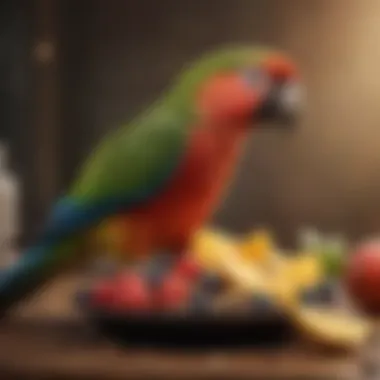
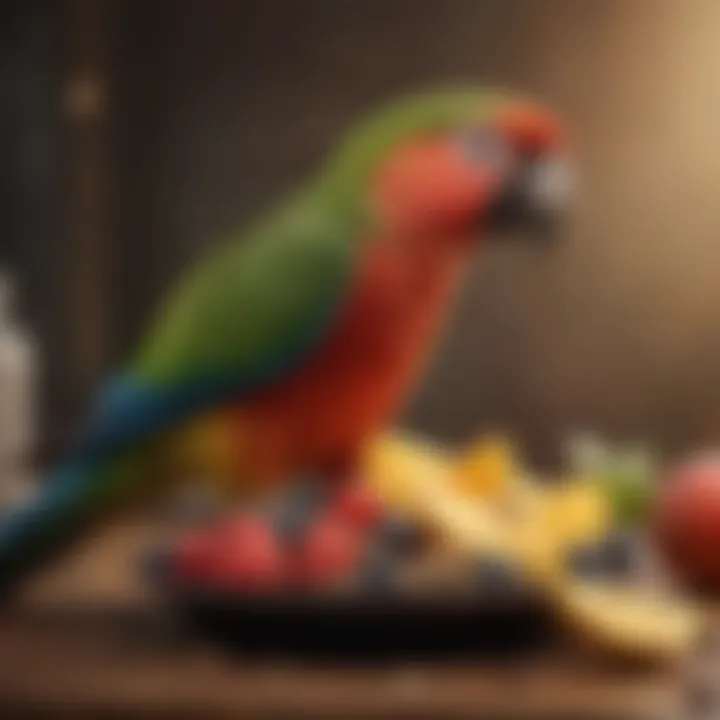
Toys and activities play a crucial role in keeping your parrot mentally stimulated.
Toys and Playtime Ideas
Invest in a variety of toys—shreddable toys, puzzles, and foraging toys help keep their minds engaged. Rotate these periodically to maintain interest.
Training and Tricks
Training is not just about obedience, but also about bonding. A simple trick, like waving or ‘step-up,’ encourages interaction and is gratifying for both you and the parrot.
Outdoor Activities and Interaction
Supervised outdoor time can introduce new sights and sounds. Always ensure safety, using harnesses if necessary, and introducing controlled exploration of their new environment.
DIY Projects for Mental Stimulation
Consider creating DIY enrichment toys. Cardboard boxes, stringing together pasta pieces, or using empty toilet paper rolls can provide unique play options while encouraging natural foraging behavior.
Understanding these elements of parrot care not only ensures optimal well-being for your bird but also enhances the quality of your shared life together. With a little effort and mindfulness, you can foster a thriving environment for your feathery friend.
The Parrot's Natural Habitat
Understanding a parrot's natural habitat is crucial for anyone considering bringing one of these vibrant creatures into their lives. The environment a parrot is used to shapes much of its behavior, dietary needs, and overall health. When creating a home for a parrot, it is essential to replicate aspects of its natural surroundings to ensure its well-being and happiness. This foundation enhances the quality of the bird's life and creates a more rewarding experience for the owner.
Geographical Distribution
Parrots are primarily found in tropical and subtropical regions. They thrive in areas ranging from the dense rainforests of the Amazon to the open woodlands and savannas of Australia. Each species, whether it’s the vibrant macaw or the playful cockatiel, has its specific areas where it flourishes. For instance, the Gray Parrot, renowned for its intelligence, is prevalent in the forests of West and Central Africa.
The geographical spread of parrots is fascinating. For example, the Hyacinth Macaw is native to Brazil, while the Eclectus Parrot can be found across the Solomon Islands and New Guinea. This variation in habitat offers insights into the birds’ behaviors and strategies for survival, illuminating the type of settings that they are accustomed to. Having this knowledge is paramount for owners, as it informs decisions regarding proper housing, behavioral expectations, and even social dynamics.
Environmental Requirements
To create an ideal environment for parrots, several components must be considered. Unlike some pets, parrots require a space that mimics their natural habitat as closely as possible. A few key environmental requirements are:
- Space and Structure: Parrots need ample space to fly and explore. A larger cage with vertical height allows them to stretch their wings and engage in physically enriching activities. The setup should include perches at different levels and a variety of surfaces for them to climb on.
- Temperature and Humidity: Most parrots flourish in warm, humid environments. A stable temperature, generally between 70-80°F (21-27°C), complements their needs well. Humidity levels should be monitored to avoid excessive dryness that can lead to respiratory issues.
- Lighting Conditions: Natural sunlight is vital for parrots. It promotes vitamin D synthesis, which is necessary for calcium absorption. Sunlight exposure also influences their circadian rhythms, affecting their mood and behavior. When sunlight is limited indoors, consider using full-spectrum lighting to support their health.
- Air Quality: Clean air is of utmost importance. Poor air circulation or exposure to smoke and other pollutants can have disastrous effects on a parrot's respiratory system. Ensure fresh air is available without drafts, and avoid using aerosol sprays or strong scents nearby.
By understanding these environmental requirements, parrot owners can create a suitable living space that promotes happiness and health in their avian friends.
Selecting the Right Space for Parrots
When it comes to keeping parrots, the space you select for them is fundamental to their well-being. Parrots aren’t just pets; they’re complex creatures that thrive in environments tailored to their specific needs. To provide a healthy living space, owners must engage in thoughtful planning, taking into account aspects like cage dimensions, layout, and essential accessories.
Creating a suitable habitat impacts not just the physical comfort of the bird but also plays a role in their behavior and emotional health. A packed and cluttered living space can lead to stress, which in turn may result in unwanted behaviors, such as feather plucking or excessive screaming. Therefore, understanding how to select and arrange the right space fosters a nurturing relationship between parrots and their owners.
Cage Dimensions and Layout
Choosing the right cage dimensions involves more than simply picking out a pretty one. It’s about providing adequate space for movement, which is critical for parrots. Birds need to be able to stretch their wings without restriction, climb, and engage in natural behaviors.
A cage must be a minimum of 24 inches long and 24 inches wide for smaller parrots like budgies, while larger species like macaws require much bigger spaces, sometimes exceeding 36 inches in width or length. Here are key points to consider when deciding on cage dimensions:
- Wing Span: Ensure that the cage is wide enough for the bird to flap its wings without hitting the bars.
- Height: Parrots love to climb. A tall cage can offer ample vertical space to engage in climbing activities.
- Shape: Rectangular cages often provide more usable space compared to rounded ones.
The layout of the cage is equally essential. A thoughtful arrangement can create an engaging environment:
- Perches: Varying the type and thickness of perches allows for natural foot exercise.
- Food and Water: Place dishes in a stable area while making sure they’re easy to reach but not positioned under where they can be soiled.
- Toys and Enrichment: Rotate and introduce new toys to prevent boredom. Position them at different heights for climbing opportunities.
Essential Accessories
Accessories are the icing on the cake when it comes to parrot care. These items help promote a stimulating environment that encourages parrots to exercise both mentally and physically. Here’s a quick look at some must-have accessories:
- Toys: Choose a variety of materials like wood, rope, and cardboard to satisfy their natural chewing instincts.
- Perches: Include natural wood perches, as they provide a more comfortable grip and vary the textures that birds encounter.
- Shredding Materials: Providing paper or palm fronds helps satisfy the urge to chew and shred, which is instinctual behavior for many parrot species.
- Cage Covers: Some parrots like a little downtime. A cover can create regions of shade, mimicking their natural habitat at dusk.
"A well-equipped space allows parrots to express their natural behaviors, contributing to their overall happiness and longevity."
It’s important to remember that every addition to the parrot’s habitat should be safe and appropriate for its size and breed. Along with a spacious and well-equipped cage, providing an entire bird-safe room for flight and play can further enhance their experience, which helps in fostering a happy, healthy parrot.
By taking these elements into account while selecting the right space, owners can lay a sturdy groundwork for a fulfilling life for their feathered companions.
Understanding Parrot Behavior
Understanding parrot behavior is not just an academic exercise; it's the key to creating a happy and healthy environment for these intelligent creatures. When we know how parrots think and interact, we can cater to their emotional and physical needs more effectively. This section digs into social structures, common traits, and stress indicators, which are vital for fostering a strong bond between parrots and their owners.
Social Structures in Parrots
Parrots are inherently social beings. In the wild, they thrive in flocks where their social hierarchy plays a crucial role in their survival. In captivity, parrots still exhibit these traits, navigating complex interactions with humans and potential companions.
- Flock Behavior: Understanding that parrots often prefer a community helps owners facilitate social interaction. They need companionship, and isolation can lead to behavioral issues.
- Bonding with Owners: Establishing a bond involves mimicry, vocalizations, and behaviors like preening. When a parrot feels close to its human, it exhibits more relaxed and playful behaviours.
- Hierarchy Awareness: Some parrots may display dominance or submissiveness, dependent on their experiences and personalities. Recognizing this can help owners manage interactions better.
Creating an environment that respects their social needs fosters a happier parrot, ultimately making the companionship more rewarding.
Common Behavioral Traits
Every parrot has its quirks, but several common behavioral traits can guide potential owners. Understanding these traits can assist in accurately interpreting their moods and needs.
- Vocalization: Parrots are known for their vocal skills. Each species has its own characteristics, but excessive screaming might indicate boredom or distress, while soft vocalizations can denote comfort.
- Chewing: Parrots are natural chewers. How they chew—vigorously or cautiously—can tell you about their emotional state.
- Dancing and Mimicking: Not only do many parrots enjoy a good shimmy, but they also mimic sounds around them. Engaging in play or interacting can be highly beneficial for their mental health.
Being aware of these behaviors lets owners understand their pet's mood swings and emotional highs and lows better.
Recognizing Signs of Stress
While enjoying the company of a parrot provides undeniable joy, it's also important to recognize when they're under stress. Parrots can struggle with anxiety and other emotional issues.
Signs to watch for include:
- Feather Plucking: A common indicator of distress, often stemming from boredom or loneliness. If you see your parrot engaging in this behavior, it's time to reassess their environment.
- Aggressive Behavior: Unexpected biting or lunging can be a parrot’s way of expressing discomfort. Understanding their triggers—whether specific sounds, actions, or even people—can help mitigate these situations.
- Abnormal Vocalizations: Sudden changes in their calling patterns can signal discontent. It might be necessary to evaluate their surroundings or routines.
Remember: Not all behavioral changes are negative; sometimes, they might simply be adapting to a new environment or schedule.
Nutrition Essentials for Parrots
Understanding the dietary needs of parrots is crucial for their well-being. Just like every other living being, these vibrant creatures need a balanced diet to thrive. Proper nutrition goes beyond just filling their bowls; it ensures they have the energy to play, bond, and express their unique personalities. A well-nourished parrot is not only healthier but also happier and more active, providing companionship that can immensely enrich your life.
Understanding Dietary Needs
Parrots are not picky eaters, but they do have specific dietary needs that must be met to keep them in tip-top shape. To put it simply, their diet should mimic what they would naturally eat in the wild, which consists of fruits, seeds, nuts, and veggies. Birds in the wilderness encounter a varied menu throughout the year, which ensures they are not missing vital nutrients, and your pet parrot deserves the same.
For instance, a parrot's diet needs to include a good balance of carbohydrates, proteins, vitamins, and minerals. Each species might have its nuances in dietary preferences; for instance, African Greys tend to prefer pellets mixed with fruits and veggies, whereas Amazon parrots might show a stronger inclination towards nuts and seeds. Therefore, it's essential to tailor your approach based on your parrot’s specific needs while incorporating diversity in their meals.
Key Nutritional Components
To nail down what your parrot needs, we’ll break down the key nutrients:
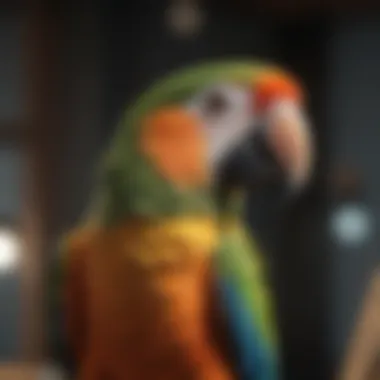
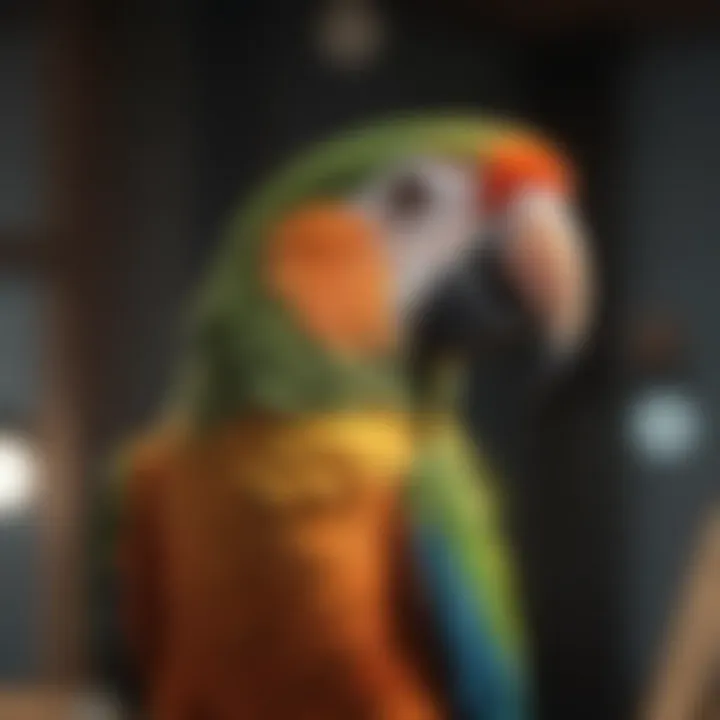
- Macronutrients: Just like humans, parrots require a balance of fats, proteins, and carbohydrates. Healthy fats, such as those found in avocados and certain seeds, play a crucial role in their energy levels.
- Proteins: Essential for growth and repair. While the amount needed can differ based on age, species, and activity level, a protein-rich diet could include legumes or cooked eggs as occasional treats. However, it’s essential not to overdo it, as too much protein can lead to liver issues.
- Vitamins and Minerals: These are vital for their overall health. For example, Vitamin A is critical for eyesight and proper immune function. Dark leafy greens are a superb source of this vitamin. Calcium is another must-have, especially for breeding females.
"Providing a variety of nutrients is like painting a beautiful masterpiece; every color contributes to the final picture of your parrot's health."
Dietary Supplements and Treats
While a proper diet is vital for a parrot's health, supplements can fill in the gaps, especially if you notice a lack of certain nutrients in their regular foods. It’s wise to consult a vet to identify any deficiencies.
- Pellets: High-quality pellets are often recommended by avian vets. They are nutritionally formulated to meet essential dietary needs. However, pellets should not entirely replace fresh produce.
- Seeds and Nuts: Though tasty treats, they should be given in moderation as too many might lead to obesity, which poses a risk. Think of seeds and nuts as the chocolates of their diet—appreciated, but best enjoyed sparingly.
- Fruits and Veggies: Fresh produce adds moisture and variety. Common favorites include carrots, apples, and peas. Rotating these helps maintain interest in their meals and supplies different nutrients.
Health and Wellness Considerations
Addressing health and wellness is crucial when discussing parrot ownership. These vibrant, intelligent creatures are not just pets; they are companions that thrive under specific conditions. Understanding their health needs can mean the difference between a lively, engaging bird and one that suffers from preventable ailments. This section will explore the common health issues parrots face, the importance of regular veterinary visits, and strategies for proactive care.
Common Health Issues
Parrots can experience a variety of health issues that owners should be aware of. Some common ailments include:
- Feather Disorders: Issues like feather plucking can stem from behavioral problems, environmental stress, or nutritional deficiencies. Owners must observe their birds for signs of discomfort or abnormal behaviors.
- Respiratory Infections: Sensitive to airborne irritants, parrots can develop respiratory troubles. Common indicators include wheezing, coughing, or nasal discharge.
- Obesity: Parrots can easily gain weight due to a sedentary lifestyle and improper diet. Obesity can lead to significant health problems, including heart disease.
- Psittacosis: Also known as parrot fever, this disease can affect both birds and humans. Symptoms may include lethargy and gastrointestinal issues.
By staying mindful of these issues, parrot owners can take early action to ensure their feathered friends maintain good health.
Regular Veterinary Check-ups
Regular veterinary check-ups form the cornerstone of any effective healthcare regime for parrots. These appointments are not merely for when the bird appears ill; they play a vital role in early detection of potential health concerns. Routine checks typically include:
- Physical Exam: A comprehensive examination helps identify any anomalies that might not be visible to the owner. This can include checking for abnormalities in the bird's feathers, beak, and overall body condition.
- Nutritional Assessment: A vet can provide insights into dietary choices, ensuring the bird receives appropriate nutrition to thrive.
- Wing Clipping and Beak Trimming: These services, if needed, can be addressed in a safe, controlled environment under professional supervision.
Owners should aim to establish a relationship with an avian veterinarian for ongoing support and guidance.
Preventative Care Strategies
Taking preventive measures can help avoid many health issues down the road. Here are some strategies every parrot owner should consider:
- Balanced Diet: Ensure a varied diet rich in fresh fruits, vegetables, and high-quality pellets. A well-rounded diet supports healthy feathers, bones, and organ function.
- Mental Stimulation: Keeping the bird mentally engaged can reduce stress and associated behaviors like feather plucking. Toys, puzzles, and interactive environments can enhance their quality of life.
- Safe Environment: It's vital to create a safe living space, free from hazards. Be mindful of household cleaners, smoke, and toxic plants often found in homes.
- Routine Interaction: Regular social interaction not only builds trust but also contributes to the mental well-being of the bird. Holding, speaking, and observing your parrot allows for an enriching experience.
"An ounce of prevention is worth a pound of cure."
Every bit of attention paid to a parrot's health fosters a longer and happier life. Making an effort to monitor their health, seek professional help, and engage in preventive care can significantly impact the overall well-being of these intelligent beings.
Creating a Stimulating Environment
Creating a stimulating environment for parrots is not just a beneficial practice; it’s vital for their mental, emotional, and physical well-being. Parrots are intelligent creatures, known for their vibrant personalities and social nature. When we provide them with an enriching habitat, we foster not just happier birds but healthier companions. Just like us, parrots thrive in settings where they can explore, discover, and express their innate behaviors.
Consider the life of a parrot in the wild. They fly through lush forests, interact with others, and forage for a variety of foods. Replicating this environment, as much as possible, at home is essential. A lack of stimulation can lead to boredom, which can then escalate to destructive behaviors or health issues. Therefore, it is paramount that parrot owners think critically about how to create a space where their feathered friends can enjoy daily engagement and interaction.
Toys and Enrichment Activities
Toys and enrichment activities form the backbone of a stimulating environment for parrots. Just dangling a plastic toy from the cage bar isn’t enough. Instead, owners should focus on providing a wide variety of toys that cater to the parrot’s specific needs and preferences. Parrots are often fascinated by toys that they can chew, climb, or manipulate. These toys can be made from safe, non-toxic materials such as wood, coconut husk, and paper.
When selecting toys, consider offering:
- Chewing Toys: These should sustain their need to gnaw on something. Wood blocks, natural branches, or items designed specifically for birds can encourage this behavior.
- Puzzle Toys: Engage their clever minds. Toys that dispense treats or require some work to uncover food can provide intellectual stimulation and prevent boredom.
- Swinging Toys: These help mimic natural behaviors, giving parrots a chance to swing and exercise.
Enrichment activities can further enhance their habitat. For instance, try rotating toys regularly or creating foraging opportunities by hiding treats throughout the cage. This sort of creativity keeps parrots engaged and promotes their natural instincts to explore and hunt for food. Using heights and levels in the cage layout can also provide them with spaces to climb and interact.
Interactive Playtime
Interactive playtime should be considered essential and not just an afterthought. Engaging directly with your parrot fosters a bond that helps both you and your feathered friend. Birds thrive on social interaction, and providing quality time outside the cage can significantly elevate their mood and well-being. Parrots may become bored or anxious when left alone for extended periods, so structured playtime is a way to alleviate this.
Planning interactive play sessions can involve a range of activities, including:
- Training Sessions: Teaching tricks is not just entertaining; it helps bond with your parrot, allowing them to learn desired behaviors while receiving mental challenges.
- ** supervised Free Flight:** When safety allows, letting a parrot fly within a secure area can replicate their natural atmosphere. It's a great way to allow them to exercise and explore freely.
- Shared Activities: Read a book aloud or listen to music together. Parrots often enjoy vocal sounds and can mimic them, enhancing their social behavior.
Taking the time to establish a routine that incorporates toys and interactive play will make a noticeable difference in your parrot’s demeanor and relationship with you. With ample thoughtful enrichment in their lives, these vibrant creatures can become not just pets, but cherished companions.
Creating a rich environment filled with engaging toys and interactive play can drastically improve your parrot's happiness and health.
By nurturing these aspects of parrot living, you pave the way for a fulfilling experience for both you and your feathery friend.
Socialization and Bonding
Creating a strong bond between parrots and their owners can be likened to the glue that keeps a relationship intact. When a parrot feels socially connected, it naturally leads to a happier, healthier bird. This section dives into the essence of socialization and bonding, illustrating its critical role in parrot ownership while unpacking some of the benefits and considerations that accompany this process.
Understanding Parrot-Owner Interactions
Parrots are incredibly intelligent creatures, often characterized by their extroverted personalities. Unlike other pets, they thrive on social interactions, not just with their human companions, but also with other birds. It's essential for parrot owners to understand their feathered friends' social needs.
- Communication: Parrots communicate through a mix of vocalizations and body language. Understanding these cues can help owners respond effectively. For instance, a parrot that bobs its head might be displaying excitement. Conversely, if a parrot ruffles its feathers and stays quiet, it may be feeling threatened or unwell. Being attentive to these signals fosters a deeper connection.
- Quality Time: Spending time engaging in various activities such as mimicry, talking, or simply sitting next to them increases the pet's comfort, leading to a relaxed and trusting environment.
- Environment Enrichment: Consider creating a visually stimulating space that encourages exploration. Parrots are naturally curious, and providing toys, perches, and safe exploration areas can enhance their interaction with their owners.
Building Trust and Affection
Trust is not given freely; it is earned over time. Building trust with a parrot can be likened to nurturing a woodland plant: it requires patience, care, and attentiveness. A strong, trustful relationship forms the backbone of affectionate interactions.
- Gradual Introduction: When bringing a new parrot home, allow them to acclimate to their new environment before rushing interactions. Approach them slowly, allowing them to become familiar with your presence. This gentle introduction eases their anxiety and lays the groundwork for confidence.
- Consistency: Being consistent in your behavior and routines helps your parrot feel secure. Regular feeding times, predictable playtime, and established vocal cues can map out an environment of stability.
- Positive Reinforcement: Rewarding desired behaviors with treats or verbal praise is an effective method. Use this technique to encourage familiarity and affectionate responses. For instance, if a parrot comes to you, gently reward them with a favorite snack.
"Patience is the key, for a parrot's trust is not won in a day."
Building a bond takes work, but the rewards are phenomenal. Not only does it enrich the parrots' lives, but it also contributes to a more fulfilling experience for owners. When the mutual trust and affection are established, both parties engage in an enriching companionship that transcends ordinary pet ownership.
Harnessing the elements of socialization and bonding can transform the dynamics of parrot care, paving the way for a truly rewarding relationship between parrots and their owners.
The Impact of Parrots on Human Lives
Living with parrots brings a variety of enriching experiences and insights into our lives. The relationship that forms between humans and these vibrant birds is profound, affecting various aspects of a person's emotional, psychological, and social landscape. Understanding how parrots influence human lives can guide potential owners and current caregivers to foster a more meaningful and fulfilling companionship. This section delves into the multifaceted impact that parrots have on their human counterparts and illustrates the blended beauty of responsibility and emotional connection that arises in such relationships.
Psychological Benefits
One of the most notable impacts parrots have on humans relates to psychological well-being. Owning a parrot can provide companionship that alleviates feelings of loneliness and isolation. When you hear the cheerful call of a parrot or see its playful antics, it can brighten even a dim day. The act of caring for a living creature cultivates a sense of purpose. Taking time to maintain their wellbeing, such as cleaning their cage or preparing their meals, can shift focus and create positive routines in an owner's life.
Moreover, research suggests that interacting with pets can lead to reduced stress levels and anxiety. The simple act of having a parrot nearby can boost your mood. Many parrot owners report feeling calmer and more content. For instance, the rhythmic sounds of a parrot’s chirping can have a meditative quality. Thinking of the funny little traits they have, like the way they fluff their feathers when they are happy, adds delight to everyday life.
"A parrot's laughter can be more uplifting than a cup of coffee at dawn."
Fostering Responsibility and Compassion
Owning a parrot isn’t just about enjoying their company; it also nurtures an owner’s sense of responsibility. Parrots require a significant commitment of time and resources. They rely on their caregivers for their daily needs, including food, social interaction, and a stimulating environment. This dependency encourages owners to be more attuned to the needs of another being.
This level of care fosters compassion. Individuals learn to be patient and understanding, grasping the importance of consistent engagement with their feathered friends. Here are a few considerations regarding responsibility and compassion:
- Daily Care: Routine feeding, socializing, and cleaning help develop a strong sense of obligation.
- Awareness of Needs: Owners become more skilled at identifying signs of illness or distress. This awareness leads to better overall care for their pet.
- Emotional Bonds: Owners often form deep emotional connections that requires attentiveness to their parrot’s mood and well-being.
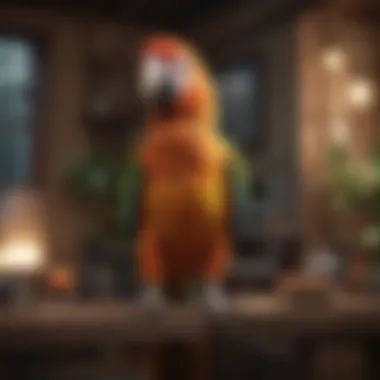
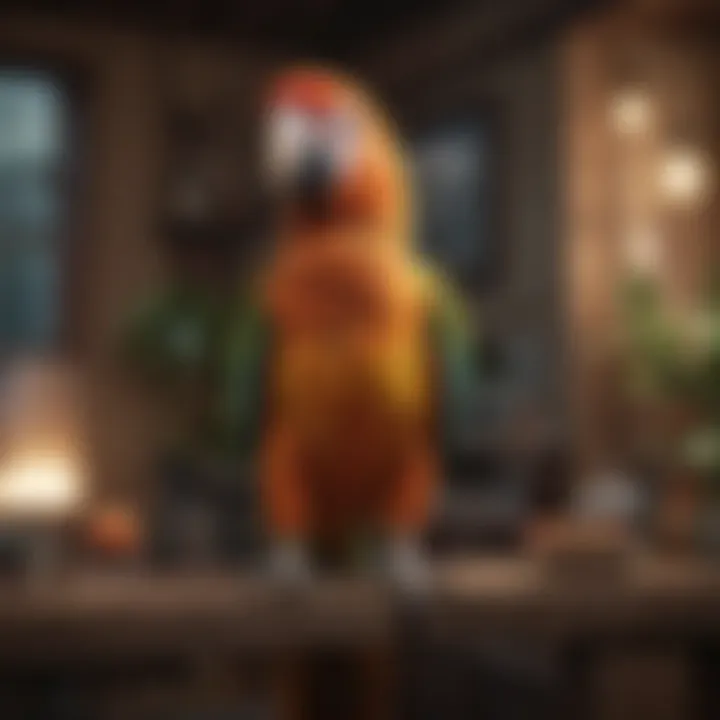
The responsibility does not just stay in the realm of personal growth; it impacts the surrounding community too. Responsible parrot owners often contribute positively to the discourse on animal welfare, promoting ethical treatment of avian species and sharing knowledge with fellow enthusiasts or potential owners.
In summary, the presence of a parrot in a human's life can lead to significant psychological benefits, along with nurturing responsibility and compassion. The unique bond formed creates an avenue for personal growth while also advocating for the broader understanding and appreciation of animal care.
Challenges of Parrot Ownership
Owning a parrot can be as rewarding as it is challenging. The beauty of these colorful creatures can easily capture anyone's heart, but it's crucial to understand what it truly means to provide for them. This section sheds light on various challenges that parrot owners must navigate. By addressing these considerations, potential and current parrot parents can make informed choices, ensuring the happiness and wellbeing of both themselves and their feathered companions.
Time Commitment
Parrots are not like other pets that can be left alone for long stretches. From the moment they enter your life, they demand time and attention. These birds are social creatures that thrive on interaction. Those quiet afternoons might quickly turn into restless hours without your ongoing engagement.
For instance, daily social interaction is essential to keep parrots happy. Simple interactions, such as talking, playing, or letting them explore their surroundings, can make a substantial difference in their mood and behavior.
- Morning Routine: Many birds wake up with the sun, and they will expect you to be there to greet them. This often involves letting them out of their cages, giving them breakfast, and engaging with them.
- Evening Wind-down: Birds also need time to settle down for the night. This may mean spending a few moments with them before bed to help them feel secure.
Each bird's needs can differ. Larger species, like macaws, may require more time than smaller ones, like budgies. To sum it up, if you value personal time more than the companionship of a parrot, you might find it difficult to adapt.
Financial Considerations
Let’s face it, parrots are not just cute faces; they come with their share of costs. One could easily be swept away by the initial price tag of buying a parrot. However, the ongoing expenses can far outweigh that.
- Basic Supplies: When introducing a parrot to your home, you need plenty of accessories besides the bird itself. Quality food, toys, cages, and perches can add up quickly.
- Veterinary Care: Regular veterinary visits are critical for your parrot's health. Birds often hide their illness, and by the time you notice, it may be too late. Routine check-ups and vaccinations can become a regular part of your expenses.
- Unexpected Costs: No one can predict when a disaster might strike. A sick bird can lead to significant vet bills that could catch an owner off guard. It’s smart to set aside funds for emergencies.
Investing in a parrot can often mean making budgetary cuts in other areas of your life to accommodate these lovelies.
Long-Term Commitment
When you welcome a parrot into your life, you're making a long-term commitment. Some species can live for 20 to 50 years, or even longer. This long lifespan means you need to consider your own lifestyle and how it may change over the years.
As life evolves, so might your circumstances. Here are a few factors to think about:
- Relocation: A move to a new city, or even a different country, can affect your bird's living conditions. Not all places are suitable for parrots, and you might end up needing to find a new home for them.
- Life Changes: Significant life events, such as marriage or starting a family, could bring new challenges for parrot care. Your attention will likely be divided, and adjusting to these changes can take time.
- Increasing Responsibilities: The obligations that come with aging—career advancements, children, and so on—can drain the time you initially dedicated to your parrot.
Taking ownership of a parrot requires reflection and commitment. It is always wise to ask yourself if you’ll be able to cater to these needs for years to come.
"A bird in the hand may be worth two in the bush, but a parrot in your home is a living commitment that goes beyond mere companionship."
It’s important to weigh all these factors before bringing a parrot into your life. With thoughtful consideration, you can create a nurturing environment for your new family member.
Sustainability and Ethical Ownership
Sustainability and ethical ownership sit at the heart of responsible parrot care. In a world where the impact of pet ownership on natural ecosystems cannot be overlooked, it's imperative for parrot owners to be well-informed about the responsibilities that come with having these intelligent creatures as companions. The issues stretch beyond mere pet care; they tap into a larger dialogue about environmental stewardship and humane practices in acquiring pets.
One primary element of this discussion is the source from which a parrot is acquired. Birds that are wild-caught contribute to habitat destruction, as trapping and relocate them from their natural environments can lead to cascading effects on the ecosystem. By contrast, sourcing parrots that are bred in captivity not only helps preserve wild populations but also ensures that the birds are often better adapted to life in a human home.
Responsible Sourcing of Parrots
Opting for ethically sourced parrots is not merely a trend; it’s a necessity. Purchasing from reputable breeders who prioritize the birds' health and socialization is crucial. A good breeder will often have the necessary breeding conditions, which include plenty of space, social interaction with other birds, and a focus on their health. By supporting these operations, owners contribute to a cycle of ethical breeding practices.
In addition, parrot rescue organizations play a vital role in sustainability. Many parrots find themselves in shelters because of an owner’s inability or unwillingness to provide the care they require. By adopting a parrot from a rescue center, not only do new owners give a second chance to a deserving bird, but they also become part of a broader movement dedicated to improving the lives of animals.
"Choosing to adopt a parrot is like saying yes to a new friend who needs you; it's about making a difference, not just for them but for the entire community of parrots awaiting homes."
Adoption vs. Purchase
When it comes to acquiring a parrot, the choice between adopting and purchasing raises ethical questions. Adoption often comes with the immediate benefit of saving a life, but that’s just the tip of the iceberg. Parrots waiting for adoption can teach owners valuable lessons about compassion and responsibility. These birds might come with their own set of challenges, possibly due to past trauma. However, this opportunity for rehabilitation can forge a bond between owner and parrot that is incredibly rewarding.
On the other hand, purchasing from breeders shouldn’t be viewed as inherently negative. When selecting a breeder, it's crucial to do diligent research. A responsible breeder will ensure that their parrots are not only healthy but also well socialized and raised with love. Some owners feel more comfortable purchasing birds, believing they can start from scratch. But it’s worth noting that nursery environments, if poorly managed, can lead to behavioral problems that result in heartache for all involved.
In essence, the distinction between adoption and purchase isn't solely about the financial transaction; it speaks volumes about how we perceive our roles as caregivers. Making an informed choice will lay the groundwork for a fulfilling companionship.
Ultimately, sustainability and ethical ownership foster an environment that benefits not just parrots but the ecosystems they inhabit. By prioritizing responsible sourcing, whether through adoption or purchase from reputable breeders, we can ensure that our love for these magnificent birds does not come at the cost of our planet's health.
Community and Resources for Parrot Enthusiasts
Engaging with a community of fellow parrot enthusiasts brings a wealth of benefits to both new and seasoned parrot owners. There’s something truly invaluable about connecting with like-minded individuals who share your passion for these vibrant creatures. It’s more than just finding someone on the same wavelength; it’s about fostering a sense of belonging and support, and as any parrot owner will tell you, this journey can be quite the adventure.
Benefits of Community Engagement
- Sharing Experiences: Every parrot has its own unique personality. Through shared stories, owners can exchange tips about care, habits, and behavioral challenges that might arise.
- Learning from Experts: Many forums or community groups have seasoned aviaries or bird trainers who can provide insights that books often overlook.
- Collaborative Support: In tough times, it can be a relief to have someone to lean on, whether it’s for advice on a sick bird or just the emotional highs and lows of ownership.
"Community support transforms the often solitary journey of parrot ownership into a shared experience filled with camaraderie and learning."
Building these connections is crucial in navigating the complexities of parrot living.
Connecting with Other Owners
Connecting with fellow parrot owners can take many forms. Whether it’s through local meetups or online interactions, establishing these relationships can be deeply enriching. Here’s how you can start:
- Local Meetups: Join local bird clubs or organizations in your area, where you can participate in gatherings, wings displays, or simply share stories over coffee.
- Social Media Groups: Platforms like Facebook host numerous groups dedicated to different species or general parrot care, fostering a space for discussion and support.
- Conventions and Workshops: Attending bird-related events can introduce you to a broader community while expanding your knowledge.
These connections often lead to lasting friendships and networks that provide ongoing support and camaraderie.
Online Forums and Groups
The internet has transformed the way communities form and thrive, and online forums and groups are no exception for parrot lovers. Here’s a rundown on the notable platforms:
- Reddit Communities: Subreddits such as r/Parrots are bustling with discussions where you can seek advice, share photos, and connect with other bird owners who understand your dilemmas and triumphs.
- Facebook Groups: Many parrot owners find comfort in dedicated groups where they can post questions, share experiences, and rally support for one another.
- Dedicated Avian Forums: Websites dedicated to pet birds often have specific threads for different parrot species, behavioral issues, and health concerns.
These forums are not just a space for advice but also celebrate the joys of parrot ownership. Through sharing moments of joy or concern, community members can help each other navigate the unique challenges that come with these incredible animals. By leveraging these online resources, you can enrich your relationship with your parrot, ensuring it thrives in a well-understood and supportive environment.
The Future of Parrot Living
Understanding the future of parrot living is vital for both parrot enthusiasts and owners looking to improve their pet experience. This topic emphasizes evolving trends and critical advancements that directly impact how we care for these intelligent and emotional beings. As our knowledge expands and society shifts towards more ethical and sustainable practices, the future of parrot ownership is likely to witness significant transformations, benefiting both parrots and their human companions alike.
Trends in Avian Care
It's important to stay informed about the latest trends in avian care, as these developments can greatly influence the well-being of our feathered friends. Here are some key trends worth noting:
- Holistic Approaches: Many bird owners now prefer a holistic view of parrot care, integrating physical, mental, and emotional well-being. This means not only focusing on diet and environment but also understanding the parrot's psychological needs.
- Focus on Enrichment: Enrichment activities are getting more attention, with many owners investing in toys and activities that mimic natural foraging and social behavior to stimulate their parrots mentally and physically.
- Technology Integration: Advances in technology are reshaping bird care. Devices such as camera systems can allow owners to monitor their birds when not at home, while smart feeding systems ensure proper diet adherence even when owners are away.
"Staying ahead of trends is crucial for the health and happiness of our parrots. Changes in our approach can lead to longer, more fulfilling lives for these pets."
- Sustainable Practices: As sustainability becomes paramount, many parrot keepers are advocating for responsible sourcing. This trend encourages the acquisition of birds from shelters or reputable breeders focused on breeding for health and temperament, reducing the impact on wild populations.
These trends reveal a profound shift in how parrot care is approached, highlighting a growing understanding of the complex requirements of these creatures.
Advancements in Nutrition and Health
The landscape of parrot nutrition and health care is evolving rapidly, with new insights leading to better diets and health standards for our pets. Here are some notable advancements:
- Customized Diet Plans: There’s a growing recognition that a one-size-fits-all approach to parrot diets doesn’t cut it. New research highlights the benefits of tailored nutritional plans that cater to specific species, sizes, and health conditions, ensuring each parrot gets what they need to thrive.
- Functional Foods: Products that serve dual purposes as food and health aids are entering the market. These functional foods include ingredients designed to boost immunity or improve feather quality while providing essential nutrition.
- Probiotics and Supplements: As with human diets, the importance of gut health is now being recognized in parrots. Probiotics and dietary supplements are gaining traction, with many owners integrating them into their birds' routines to promote better digestion and overall health.
- Veterinary Innovations: Advances in veterinary medicine, such as improved diagnostic tools, allow for earlier detection of health issues. Regular check-ups facilitated by these advancements can lead to proactive health management.
Through these developments, owners can ensure that their parrots enjoy a balanced diet, improved health, and a higher quality of life.
By embracing these trends and advancements, parrot owners are not just keeping pace with the times; they are actively contributing to a future where parrots can flourish in environments that respect their natural needs. Investing effort into these gentle giants reaps rewards that benefit both the parrot and the owner.















